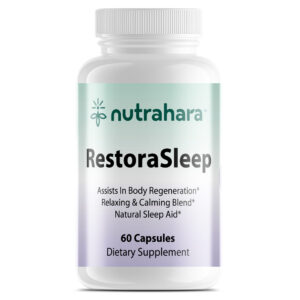
Nutrahara Blog
Nutrahara Blog
Female Sexual Health After Childbirth
I. Introduction
Addressing the nuances of female sexual health after childbirth is paramount in empowering women through every stage of their journey. While the focus often centers on the physical aspects of recovery postpartum, the impact on sexual well-being is frequently overlooked. For women aged 30 to 60, encompassing various stages from menstruation to menopause, the transition into motherhood can bring forth a multitude of changes that extend beyond the delivery room.
Importance of Addressing Female Sexual Health After Childbirth
Childbirth heralds a significant transformation in a woman’s life, both physically and emotionally. Amidst the joy and challenges of nurturing a newborn, the shift in focus from self-care to infant care can inadvertently neglect a woman’s own needs, particularly concerning sexual health. Yet, the repercussions of dismissing these concerns reverberate beyond the bedroom, affecting relationships and overall well-being.
For many women, the postpartum period introduces a myriad of changes that can impact their sexual health journey. From hormonal fluctuations to physical discomfort and emotional adjustments, the landscape of intimacy undergoes a profound evolution. Recognizing and addressing these changes is not only pivotal for reclaiming sexual vitality but also for fostering a sense of agency and self-assurance in navigating this transformative phase of life.
Throughout this article, we delve into the intricacies of female sexual health after childbirth, shedding light on seldom-discussed topics and offering insights tailored to the unique needs of women aged 30 to 60. By embracing a holistic approach that encompasses physical, emotional, and lifestyle factors, we aim to empower women to reclaim control over their sexual well-being and embrace motherhood with confidence and vitality.
II. Understanding Post-Childbirth Changes
The journey of childbirth extends far beyond the delivery room, encompassing a profound transformation that resonates through a woman’s body and psyche. Understanding the intricate post-childbirth changes that occur postpartum is essential for navigating this transitional phase with grace and resilience.
Physical Changes
During pregnancy, the female body undergoes a remarkable array of anatomical and physiological adjustments to support the development and sustenance of the fetus. These changes persist even after childbirth, shaping the landscape of postpartum recovery. As Courtney Abshier, MD, highlights in her comprehensive guide to post-pregnancy body changes, the postpartum period, often referred to as the “fourth trimester,” spans approximately 12 weeks following delivery. Guide to Post-Pregnancy Body Changes.
Emotional Changes
While the joy of welcoming a new life into the world is unparalleled, the postpartum period can also bring forth a spectrum of emotional challenges. For some women, these challenges manifest as postpartum depression, a more severe and enduring form of depression that can onset during pregnancy and persist after childbirth. Understanding the symptoms and causes of postpartum depression is crucial for early detection and intervention. The Mayo Clinic provides valuable insights into this condition, shedding light on its prevalence, risk factors, and treatment options. Mayo Clinic – Postpartum Depression.
By acknowledging and comprehending the myriad changes that occur in the postpartum period, women can embark on a journey of self-discovery and healing, reclaiming their vitality and embracing the transformative power of motherhood.
III. Common Concerns and Challenges
Navigating the landscape of sexual health after childbirth can present a myriad of concerns and challenges for women aged 30 to 60. From physical discomfort to emotional adjustments, understanding and addressing these common issues is essential for reclaiming intimacy and vitality in the postpartum period.
Decreased Libido
One of the most prevalent concerns among women after childbirth is a decrease in libido or sexual desire. This decline can be attributed to various factors, including hormonal fluctuations, fatigue, and changes in body image. The demands of caring for a newborn, coupled with the physical and emotional toll of childbirth, can leave women feeling depleted and disconnected from their sexuality. However, it’s essential to recognize that a diminished libido is a normal aspect of postpartum recovery and not indicative of inadequacy or dysfunction. By acknowledging and discussing these feelings with their partners and healthcare providers, women can explore strategies to reignite their desire and rediscover pleasure in intimacy.
Pain or Discomfort During Intercourse
Another common challenge faced by women postpartum is experiencing pain or discomfort during intercourse. This discomfort can stem from various factors, including vaginal dryness, scar tissue from episiotomies or tears, and lingering pelvic floor issues. Additionally, emotional factors such as anxiety or fear of pain can exacerbate physical discomfort, creating a cycle of avoidance and further distress. Addressing these concerns requires a multifaceted approach that encompasses physical therapy, lubricants, and open communication with partners. Seeking guidance from healthcare providers specializing in postpartum sexual health can provide tailored solutions to alleviate pain and restore comfort during intimacy.
By acknowledging and addressing these common concerns and challenges, women can embark on a journey of healing and self-discovery, reclaiming their sexuality and embracing the fullness of postpartum life.
IV. Navigating Sexual Health After Childbirth
Navigating sexual health after childbirth requires a nuanced approach that prioritizes open communication, informed decision-making, and proactive self-care. For women aged 30 to 60, encompassing various stages of motherhood and maturity, reclaiming intimacy postpartum involves addressing both physical and emotional aspects of sexual well-being.
Communication with Partner
Open and honest communication with a partner is foundational to navigating sexual health after childbirth. Many women may feel apprehensive or embarrassed discussing postpartum concerns, but fostering a supportive and understanding environment can facilitate meaningful dialogue. Partners play a crucial role in validating women’s experiences, offering reassurance, and collaboratively exploring solutions to address sexual health challenges. By approaching these conversations with empathy and respect, couples can strengthen their bond and cultivate intimacy that transcends physicality.
Seeking Professional Help
When navigating postpartum sexual health challenges, seeking guidance from healthcare providers specializing in women’s health is invaluable. Obstetricians, gynecologists, and sexual health specialists possess expertise in addressing a range of postpartum concerns, from hormonal imbalances to pelvic floor dysfunction. These professionals can conduct comprehensive assessments, provide tailored treatment options, and offer guidance on enhancing sexual well-being. From recommending pelvic floor exercises to prescribing hormone therapy, healthcare providers play a pivotal role in empowering women to reclaim agency over their sexual health journey.
Available Treatments and Therapies
In addition to traditional medical interventions, various complementary therapies and treatments can support postpartum sexual health. Pelvic floor physical therapy, for example, focuses on strengthening pelvic muscles and alleviating discomfort associated with childbirth. Additionally, mindfulness practices such as meditation and yoga can cultivate body awareness, reduce stress, and enhance sexual satisfaction. Integrating these holistic approaches into postpartum care empowers women to address sexual health concerns from a holistic perspective, nurturing mind, body, and spirit.
By embracing open communication, seeking professional guidance, and exploring holistic treatment modalities, women can navigate the complexities of postpartum sexual health with confidence and resilience. Through proactive self-care and collaborative partnerships, they can cultivate intimacy that honors their unique experiences and fosters deep connection.
V. Lifestyle Factors for Enhancing Sexual Health
Optimizing sexual health after childbirth encompasses more than just addressing physical symptoms; it involves nurturing holistic well-being through lifestyle choices that support vitality and intimacy. For women aged 30 to 60, incorporating specific nutrition, exercise, and self-care practices into daily life can profoundly impact sexual well-being and overall quality of life.
Nutrition and Hydration
A balanced diet rich in essential nutrients is foundational to supporting sexual health postpartum. Foods that are high in antioxidants, vitamins, and minerals promote hormonal balance, enhance blood flow, and boost energy levels—all essential components of a fulfilling sex life. Additionally, staying hydrated is paramount for maintaining vaginal health and lubrication. Incorporating foods such as leafy greens, fruits, lean proteins, and healthy fats can provide the nutrients necessary for optimal sexual function and overall well-being.
Exercise and Physical Activity
Regular exercise is not only beneficial for physical health but also plays a crucial role in enhancing sexual vitality postpartum. Engaging in activities that promote cardiovascular health, such as brisk walking, cycling, or swimming, can improve blood circulation and stamina, contributing to increased arousal and satisfaction during intimacy. Furthermore, exercises that target the pelvic floor muscles, such as Kegels, can strengthen pelvic floor support and alleviate issues such as urinary incontinence and discomfort during intercourse.
Recommended Exercises for Postpartum Women
For postpartum women, gentle yet effective exercises can aid in restoring pelvic floor strength and abdominal tone. Pilates and yoga, specifically tailored for postpartum recovery, focus on core stabilization, pelvic alignment, and breath awareness—essential elements for restoring balance and vitality after childbirth. Additionally, incorporating mindfulness practices such as meditation and deep breathing exercises can reduce stress, enhance body awareness, and promote relaxation, all of which are conducive to a satisfying and fulfilling sex life.
By prioritizing nutrition, exercise, and self-care practices that support sexual health, women can reclaim vitality and intimacy postpartum. From nourishing the body with wholesome foods to engaging in physical activities that promote strength and flexibility, embracing a holistic approach to well-being fosters a deeper connection with oneself and one’s partner, enriching the journey of postpartum recovery and intimacy.
VI. Self-Care Practices
In the whirlwind of postpartum adjustments, prioritizing self-care practices is essential for nurturing emotional well-being and reclaiming intimacy after childbirth. For women aged 30 to 60, incorporating mindfulness techniques, stress management strategies, and restorative rituals into daily life can foster resilience and deepen connection with oneself and one’s partner.
Stress Management Techniques
The demands of new motherhood, coupled with the physical and emotional toll of childbirth, can lead to heightened stress levels for many women. Implementing stress management techniques is crucial for mitigating the effects of stress on sexual health and overall well-being. Mindfulness practices such as meditation, deep breathing exercises, and progressive muscle relaxation can help alleviate anxiety, promote relaxation, and enhance body awareness—creating a conducive environment for intimacy and pleasure.
Incorporating Yoga and Meditation
Yoga and meditation are powerful tools for postpartum recovery, offering a holistic approach to physical and emotional healing. Specifically tailored practices for postpartum women focus on gentle movements, breath work, and meditation techniques that promote relaxation, strengthen the pelvic floor, and cultivate body awareness. By incorporating yoga and meditation into their daily routine, women can alleviate tension, enhance flexibility, and reconnect with their bodies, laying the foundation for a fulfilling and satisfying sex life.
Relaxation Strategies for Reducing Stress
In addition to formal mindfulness practices, incorporating relaxation strategies into daily life can help women manage stress and enhance overall well-being. Engaging in activities such as reading, listening to music, taking soothing baths, or spending time in nature can provide moments of respite amidst the demands of motherhood. By carving out time for self-care and relaxation, women can replenish their energy reserves, reduce stress levels, and foster a greater sense of balance and harmony in their lives.
Prioritizing Sleep
Quality sleep is paramount for postpartum recovery and sexual health. However, the challenges of caring for a newborn often disrupt sleep patterns, leaving women feeling exhausted and depleted. Prioritizing sleep hygiene practices, such as creating a calming bedtime routine, establishing a consistent sleep schedule, and creating a conducive sleep environment, can promote restorative sleep and enhance overall well-being. By prioritizing adequate rest, women can replenish their energy reserves, improve mood, and optimize sexual health and intimacy postpartum.
By incorporating self-care practices into their daily routine, women can nurture their physical, emotional, and spiritual well-being, reclaiming vitality and intimacy after childbirth. From stress management techniques to mindfulness practices and prioritizing sleep, embracing a holistic approach to self-care empowers women to cultivate resilience, deepen connection, and thrive in the journey of postpartum recovery and motherhood.
VII. Empowerment and Confidence Building
Empowering women to embrace their postpartum bodies and cultivate confidence is essential for fostering a positive and fulfilling sexual experience after childbirth. For women aged 30 to 60, navigating the complexities of body image and self-esteem requires a holistic approach that celebrates the journey of motherhood and honors the unique experiences of each individual.
Embracing Body Changes
The physical changes that accompany childbirth can often evoke feelings of insecurity and self-doubt. However, it’s essential to recognize that these changes are a natural and beautiful part of the postpartum journey. Embracing one’s postpartum body, with all its imperfections and scars, is a powerful act of self-love and acceptance. By reframing perceived flaws as badges of honor that signify the incredible feat of bringing life into the world, women can reclaim ownership of their bodies and celebrate the resilience and strength they embody.
Positive Body Image After Childbirth
Cultivating a positive body image after childbirth involves shifting the focus from external appearances to inner qualities and strengths. Instead of fixating on societal standards of beauty, women can cultivate self-compassion, resilience, and gratitude for the miraculous capabilities of their bodies. Surrounding oneself with supportive and affirming influences, whether through social connections, media consumption, or self-affirmation practices, can bolster self-esteem and foster a sense of empowerment in one’s postpartum body.
Celebrating the Journey of Motherhood
Motherhood is a transformative journey that encompasses a spectrum of emotions, experiences, and challenges. Rather than viewing childbirth as the end of one’s identity or aspirations, women can embrace it as the beginning of a new chapter filled with growth, discovery, and fulfillment. Celebrating the joys and triumphs of motherhood, no matter how small, can instill a sense of pride and confidence in one’s abilities as a parent and a woman. By reframing motherhood as a source of strength and empowerment, women can embrace their postpartum journey with courage, resilience, and unwavering self-assurance.
Self-Esteem Boosters
In addition to celebrating the journey of motherhood, incorporating self-esteem boosters into daily life can further enhance confidence and empowerment. Engaging in activities that bring joy, fulfillment, and a sense of accomplishment, whether it’s pursuing hobbies, setting and achieving goals, or practicing acts of self-care, can reinforce a positive self-image and foster a deep sense of self-worth. By prioritizing self-love and self-care, women can cultivate a reservoir of inner strength and confidence that transcends external validation and empowers them to embrace their postpartum journey with grace and resilience.
By embracing empowerment and confidence-building practices, women can reclaim agency over their postpartum experience, cultivating a sense of self-assurance and vitality that enhances sexual health and intimacy. From embracing body changes to celebrating the journey of motherhood and prioritizing self-esteem boosters, embracing empowerment and confidence-building practices empowers women to navigate the postpartum journey with courage, resilience, and unwavering self-assurance.
VIII. Conclusion
The journey of reclaiming sexual health after childbirth is a multifaceted and deeply personal experience that requires courage, resilience, and self-compassion. For women aged 30 to 60, navigating the complexities of postpartum recovery involves addressing physical changes, emotional challenges, and societal expectations with grace and confidence.
Throughout this article, we’ve explored the common concerns and challenges faced by women in the postpartum period, from decreased libido to body image insecurities. We’ve delved into practical strategies for navigating these challenges, including open communication with partners, seeking professional help, and prioritizing self-care practices that support holistic well-being.
From embracing body changes to celebrating the journey of motherhood and prioritizing self-esteem boosters, empowering women to reclaim agency over their postpartum experience is paramount. By fostering a supportive and inclusive environment that honors the diverse experiences of women, we can create a culture that celebrates the resilience, strength, and beauty of motherhood in all its forms.
As women embark on their postpartum journey, it’s essential to remember that healing is not linear and that progress takes time. By embracing self-compassion and practicing patience, women can navigate the ups and downs of postpartum recovery with grace and resilience, emerging stronger and more empowered than before.
Ultimately, reclaiming sexual health after childbirth is about embracing the fullness of one’s experience, celebrating the body’s incredible capabilities, and cultivating a deep sense of self-assurance and vitality. By embracing empowerment and confidence-building practices, women can navigate the postpartum journey with courage, resilience, and unwavering self-assurance, reclaiming intimacy and vitality with grace and confidence.
Written by the Nutrahara Team
This article was prepared by the expert team at Nutrahara, which includes experienced nutrition scientists and naturopaths dedicated to advancing women’s health through natural wellness solutions. We combine scientific research with holistic practices to help you live your healthiest life.
Connect with us on LinkedIn to stay updated on the latest in women’s health and wellness.














